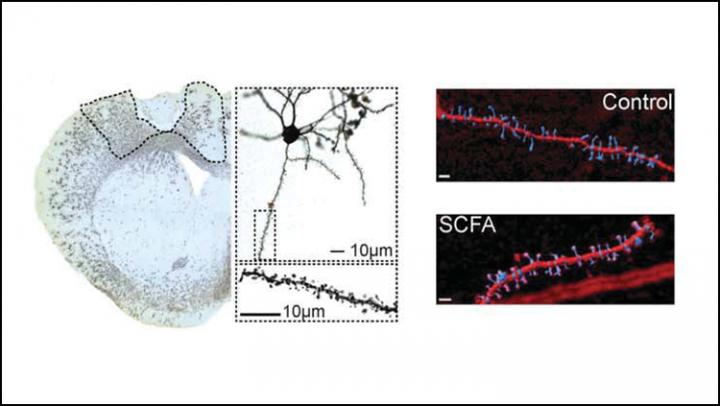
Supplementing the body’s short chain fatty acids can improve stroke recovery, according to research in mice recently published in JNeurosci. Short chain fatty acid supplementation may be a non-invasive addition to stroke rehabilitation therapies.
The gut microbiome influences brain health, including how the brain recovers from stroke. Short chain fatty acids, a fermentation product from the bacteria in our guts, are a key component of gut health but their role in stroke recovery has not been explored.
Sadler et al. added short chain fatty acids to the drinking water of mice for four weeks before inducing a stroke. The mice that drank the fatty acid water experienced a better stroke recovery compared to the control mice, including reduced motor impairment and increased spine growth on dendrites – a crucial memory structure. Additionally, the fatty acid-supplemented mice expressed more genes related to microglia, the brain’s immune cells. Microglia activity could be responsible for increasing dendritic spines and improving stroke outcome. This relationship indicates short chain fatty acids may serve as messengers in the gut-brain connection by influencing how the brain responds to injury.
###
Manuscript title: Short-Chain Fatty Acids Improve Post-Stroke Recovery via Immunological Mechanisms
Please contact media@sfn.org for full-text PDF and to join SfN’s journals media list.
About JNeurosci
JNeurosci, the Society for Neuroscience’s first journal, was launched in 1981 as a means to communicate the findings of the highest quality neuroscience research to the growing field. Today, the journal remains committed to publishing cutting-edge neuroscience that will have an immediate and lasting scientific impact, while responding to authors’ changing publishing needs, representing breadth of the field and diversity in authorship.
About The Society for Neuroscience
The Society for Neuroscience is the world’s largest organization of scientists and physicians devoted to understanding the brain and nervous system. The nonprofit organization, founded in 1969, now has nearly 37,000 members in more than 90 countries and over 130 chapters worldwide.
Disclaimer: AAAS and EurekAlert! are not responsible for the accuracy of news releases posted to EurekAlert! by contributing institutions or for the use of any information through the EurekAlert system.

